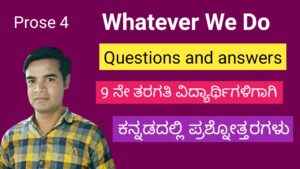Whatever We Do lesson questions and answers for 9th standard students. Here we will discuss notes of the lesson Whatever We Do. Thsese questions are very useful for 9th class exam.
To get more video lessons visit our YouTube channel. You can also lern English grammar for 9th standard students.
c 1 Whatever we do lesson questions
Whatever We Do lesson questions and answers:
1. The author says, “Let us make them better and better.” What does the word ‘them’ stand for here?
Ans: According to author them stands for our actions and our words.
2. Imagine that a parent of your friend says, “Work only for the result.” How would you respond to this statement?
Ans: I would respond to this statement by saying, “Thanks a lot for your kind suggestion.”
3. What are the ways in which we usually thank a person for having helped?
Ans: “Thanks”, “Thanks a lot”, “I am very grateful to you”, “You’ve been of great help. I thank you from the bottom of my heart!”
4. How do you react if others make you wait?
Ans: ‘oh! It’s ok’, and “It’s pleasure waiting for you.”
5. Why does the author lay emphasis on adding words to our actions and also on adding actions to our words?
Ans: The author lay emphasis on adding words to our actions and also on adding to our words to make our action or words better.
6. What sort of word and what kind of action would make any situation better?
Ans: “I am very sorry, giving to trouble”, “One minute sir, we fill finish in no time”, “You could have thought of lending a helping hand to them.”
C 2 Whatever We Do lesson questions and answers
Whatever We Do lesson questions and answers:
1. How do you think doctors can improve their image with their language?
Ans: Doctors treating patients can make their jobs much better. It is said that a couple of friendly words or a smile can make the patient feel better.
2. What difference do you find in the autorickshaw driver’s response? Discuss.
Ans: In the first incident the autorikshaw driver simply downed the meter. He can’t speak anything. In the second incident the driver said “Sorry”. He called another autorickshaw driver. This shows that we can say NO also in the most pleasant way.
3. If we decide to give alms to a beggar, how should we give it?
Ans: We can give alms to a beggar in a better way, “Here, take this”. Or we can say, “Sorry, I am not able to give.”
4. How would public notices need to be changed, according to the author?
Ans: According to author the public notices should not be rough or add. The notice like “No smoking” can be written “Thank you for no smoking.”
5. Pick out any public notice. Try to make it read more polite.
Ans: “Don’t sit here for a long time” can be written “Kindly make room for waiting friends.” “No smoking” can be written “Thank you for no smoking.”
c 3
1. What word usually makes our enquiries more polite? Illustrate with an example.
Ans: The word “Pleas” usually makes our enquiries more polite. Normally most of us ask “Who’s this?” when we receive phone call. Instead of that we can say more politely “May I know who is calling, please?”
2. Imagine that you are talking to someone on the phone. How would you start the conversation?
Ans: We start our conversation by saying “May I know who is calling, please?”
3. Read paragraph-14 carefully. Do you agree with the comparison made there? Discuss.
Ans: Yes, I agree with the comparison. If we want to converse with others, it is better to use ‘you’ first before ‘I’. It is more effective and more polite.
4. Why does the author say that there is no formula for best action or best form of speech?
Ans: There is no limit to the improvement our action or speech. What is best may depend on the occasion. The whole idea is to be aware of the need and importance of doing and saying things better and better.
Other questions: Whatever we do
Whatever We Do lesson questions and answers:
C1. The author gives a number of instances of expressions that sound odd or unpleasant. Find all such expressions from the text and rewrite them in a polite form.
Ans: 1. Thanks – Thanks a lot, I am very grateful to you. I thank from the bottom of my heart.
2. No smoking – Thank you for not smoking.
C2. Recall a situation that still makes you feel pleased by the speaker’s words. Why? Discuss.
Ans: Once author called an auto and said “Central market” he said “Sorry sir it’s time for me to hand over the auto.” This shows that we can say ‘No’ also in the most pleasant way.
C3. How can we react if someone says ‘No’? Why? Discuss.
Ans: We can react in a polite way if someone says ‘no’. Our reaction must depend on time and situation. If we behave in polite way, the same person can say ‘yes’. There is a chances of changing his behaviour immediately.
Watch this video for summary of the lesson Whatever We Do.

